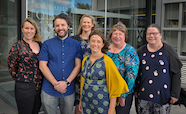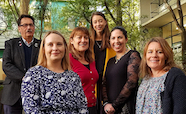This research examines what happens at a population level that affects mental health and examines how policy can influence health, and how services are provided and can be improved.
Bioethics Centre
 Bioethics is the study of ethical issues arising within health care and the life sciences. The wide range of research projects and activities of the Bioethics Centre aims to examine the conventional and novel moral dilemmas arising from medical research, clinical settings, and advances brought about by life sciences and biotechnologies.
Bioethics is the study of ethical issues arising within health care and the life sciences. The wide range of research projects and activities of the Bioethics Centre aims to examine the conventional and novel moral dilemmas arising from medical research, clinical settings, and advances brought about by life sciences and biotechnologies.
Research theme: Philosophy, psychiatry, psychology, neuroscience, and mental (ill) health
How should mental health and ill-health be conceptualised, investigated, and treated? The picture today is complex, confusing and perhaps even contradictory. Today, people with various forms of mental health problems may find themselves consulting a psychiatrist, a clinical or a neuro-psychologist, a counsellor, or possibly a neurosurgeon—and perhaps more than one of these.
Email bioethics@otago.ac.nz
Web otago.ac.nz/bioethics/research/themes/otago070480.html
Department of Preventive and Social Medicine
 We work to understand why some people are healthy and some are not, how to prevent illness and injury, how people's health can be improved through working with communities, how political systems and health organisations affect health, and other issues relating to the health of populations.
We work to understand why some people are healthy and some are not, how to prevent illness and injury, how people's health can be improved through working with communities, how political systems and health organisations affect health, and other issues relating to the health of populations.
Dr Shyamala Nada-Raja is a Senior Research Fellow and conducts research funded by HRC, MBIE, and the University of Otago on the:
- Determinants of mental health and well-being in youth, including high school and university students
Online Well-being Interventions - Epidemiology of self-harm / suicide / violence based on the Dunedin Study
- Rural mental health and well-being
- E-health interventions for mental health, well-being, and violence prevention
Harmonised app
Email shyamala.nada-raja@otago.ac.nz
Department of Psychological Medicine, University of Otago, Christchurch (UOC)
 The Department of Psychological Medicine in Christchurch has two major streams of research:
The Department of Psychological Medicine in Christchurch has two major streams of research:
- Clinical Research
- Health and Development Study
Clinical Research
The Clinical Research Unit (Mental Health) has an established platform of research projects related to improving treatments and outcomes for those with serious mental health disorders.
Project: Translating Social Rhythm Therapy into Community Mental Health Services
Feasibility grant funded by HRC .
Investigators: Richard Porter, Marie Crowe, Maree Inder
Project in development: Tele-Interpersonal and Social Rhythm Therapy for mood disorder
Health and Development Study
The Christchurch Health and Development Study ( CHDS ) has followed the health, education and life progress of a group of 1,265 children born in the Christchurch (New Zealand) urban region during mid 1977.
Contact Professor John Horwood or Associate Professor Joseph Boden for further information and study opportunities.
Email judith.stone@otago.ac.nz
Web otago.ac.nz/christchurch/departments/psychmed/research/
Department of Psychological Medicine, University of Otago, Wellington (UOW)
 Our research programmes are configured around several themes relevant to mental health practice in the New Zealand setting:
Our research programmes are configured around several themes relevant to mental health practice in the New Zealand setting:
- Physical health of people with mental illness, including obesity and sleep
- Mental health service delivery and evaluation, including in primary care and secondary care
- The interface between psychological and physical health
- Social psychiatry and psychiatric epidemiology
- Suicide
- Service user-led and co-produced research and teaching (World of Difference project)
- Personality and its role in mental illness
- Education in the clinical professions
- Addictions
- Mental health law
- Stigma and discrimination
Addiction
Associate Professor Giles Newton-Howes is a general adult consultant psychiatrist with a sub-specialty in substance-misuse psychiatry. His research interests include the clinical understanding of personality disorders, particularly as they relate to psychiatric patients and mental-state disorder. He is also interested in the interface between psychiatry and society, particularly the application of coercive practices.
Service-user research
World of Difference is a new service-user research group focused on ending discrimination, and promoting recovery, inclusion, and respect for the human rights of people who experience mental distress, led and delivered by experts with personal experience. It is led by Associate Professor Sarah Gordon.
Email kristy.wilson@otago.ac.nz
Web otago.ac.nz/wellington/departments/psychologicalmedicine/research/
EleMent: Electronic data for mental health research
 EleMent are a multidisciplinary research group bringing together expertise in epidemiology, public health and data science with clinical and lived experience of mental distress. We use routinely collected electronic data from numerous sources alongside qualitative methods to understand the distribution, determinants and lived experience of mental distress in New Zealand. We have considerable experience in using linked electronic data for health research, including using the Statistics New Zealand Integrated Data Infrastructure (IDI).
EleMent are a multidisciplinary research group bringing together expertise in epidemiology, public health and data science with clinical and lived experience of mental distress. We use routinely collected electronic data from numerous sources alongside qualitative methods to understand the distribution, determinants and lived experience of mental distress in New Zealand. We have considerable experience in using linked electronic data for health research, including using the Statistics New Zealand Integrated Data Infrastructure (IDI).
Research Associate Professor Ruth Cunningham leads the research team and is a public health physician and epidemiologist. Her research areas include mental health and suicide epidemiology, the physical health of people with experience of mental distress and mental health service research with a focus on Maori.
Dr Debbie Peterson is a Senior Research Fellow whose research focuses on the issues affecting people with experience of mental distress, and whose lived experience informs her research practice. Her research areas include employment, recovery, suicide, discrimination, service provision and consumer involvement.
Public mental health current and recent research projects
Health and social outcomes for people with experience of mental distress
- Cancer survival disparities and severe mental illness
- Developing new cardiovascular risk prediction algorithms for people with mental illness
- Pathways to first episode psychosis for rangatahi Māori (in collaboration with MIHI)
Disparities in mental and other health service provision
- Projects examining mental health service provision for Māori, in collaboration with the Māori Indigenous Health Institute (MIHI) at the University of Otago Christchurch
- Mental health service provision for older New Zealanders
Mental health epidemiology and the social determinants of mental health
- We were commissioned by the Government Inquiry into Mental Health and Addiction to complete two large pieces of background work in 2018.
Mental Health Inquiry Commissioned Reports
Email ruth.cunningham@otago.ac.nz
Web otago.ac.nz/wellington/departments/publichealth/research/element/research/otago675769.html
General Practice Research Group, (UOC)
 Professor Dee Mangin leads the Christchurch General Practice Research Group which focuses on clinical research, where the results can be directly translated into clinical practice.
Professor Dee Mangin leads the Christchurch General Practice Research Group which focuses on clinical research, where the results can be directly translated into clinical practice.
The two central research themes underpinning this are rational use of medicines and innovative models of primary care.
Relevant research projects:
- Selective serotonin reuptake inhibitors (SSRI) study: Stable primary care depression: maintenance vs gradual withdrawal of fluoxetine
- Legacy drug prescribing patterns in primary care: Investigating the potential of legacy prescribing to contribute to unnecessary polypharmacy
Email generalpractice.uoc@otago.ac.nz
Web otago.ac.nz/christchurch/research/generalpractice/
Kōhatu–Centre for Hauora Māori
 Kōhatu provides the focus for hauora Māori (Māori health) within the Dunedin School of Medicine and involves teaching, research, Māori strategic development (including workforce and professional development), community networking, and student relationships and support.
Kōhatu provides the focus for hauora Māori (Māori health) within the Dunedin School of Medicine and involves teaching, research, Māori strategic development (including workforce and professional development), community networking, and student relationships and support.
Associate Professor Jo Baxter, Director, has a range of research interests including Māori mental health, Māori medical workforce development, hazardous drinking among tertiary students and health inequalities.
She has current research collaborations with the Injury Prevention Research Unit (Hazardous drinking project) and the New Zealand Mental Health Epidemiology Survey team. She is also the Theme Leader for Māori Health in the Dunedin longitudinal study, a multidisciplinary, longitudinal study of 1,037 babies born in Dunedin during 1972–3.
Email tui.kent@otago.ac.nz
Web otago.ac.nz/dsm-dean/student-support/hauora-maori
Ngāi Tahu Māori Health Research Unit – Te Roopū Rakahau Hauora Māori o Kāi Tahu
 The Ngāi Tahu Māori Health Research Unit (NTMHRU) contributes to a wide range of Māori health research projects and initiatives within the Department of Preventive and Social Medicine, the University of Otago, and our communities to ensure important and beneficial outcomes for Māori.
The Ngāi Tahu Māori Health Research Unit (NTMHRU) contributes to a wide range of Māori health research projects and initiatives within the Department of Preventive and Social Medicine, the University of Otago, and our communities to ensure important and beneficial outcomes for Māori.
Our people – Ko tātou
Research in mental health:
Scoping Rangatahi Primary Mental Health – A kaupapa Māori approach to identifying the gaps and need
Professor Sue Crengle, and Ms Vicky Nelson are aiming to improve primary mental health care for rangatahi by exploring:
- What rangatahi mental health needs and gaps are within community and primary mental healthcare contexts
- Primary mental health pathways and strategies that would address this need; being more responsive and effective for rangatahi Māori and their whānau
This project is underpinned by kaupapa Māori principles and theory and is supported by:
- Professor Emma Wyeth (NTMHRU)
- Associate Professor Leonie Pihama, Director of Te Kotahi Research Institute
- Dr Terryann Clarke, senior lecturer University of Auckland and Manaia Health PHO Child and Youth Friendly Cities Co-ordinator
More about this project:
Vicky Nelson presented her research at the In-house Convention
The Psychological and Physical Health and Wellbeing of New Zealand Contemporary Veterans
Professor Emma Wyeth is a Named Investigator on this project led by Professor David McBride. The project aims to describe the risk and protective factors for health and well-being of New Zealand veterans, including specifically for Māori veterans, who have served during and since the Persian Gulf War. This study will help to determine the prevalence of post-traumatic stress disorder (PTSD) and Multiple Symptom Illness (MSI) for this group.
Email ntmhru@otago.ac.nz
Web otago.ac.nz/maori-health-research/research/index.html
Te Rōpū Rangahau Hauora A Eru Pōmare – Eru Pōmare Māori Health Research Centre
 Te Rōpū Rangahau Hauora a Eru Pōmare strives to create a Kaupapa Māori space committed to improving Māori health outcomes and eliminating inequalities through quality science and ongoing theoretical development. It takes a rights-based approach consistent with the Treaty of Waitangi, and is engaged with community through a spectrum of influence from community development, policy advocacy, research dissemination and Māori health research workforce development.
Te Rōpū Rangahau Hauora a Eru Pōmare strives to create a Kaupapa Māori space committed to improving Māori health outcomes and eliminating inequalities through quality science and ongoing theoretical development. It takes a rights-based approach consistent with the Treaty of Waitangi, and is engaged with community through a spectrum of influence from community development, policy advocacy, research dissemination and Māori health research workforce development.
Email bridget.robson@otago.ac.nz
Web otago.ac.nz/wellington/departments/publichealth/research/erupomare/research/
